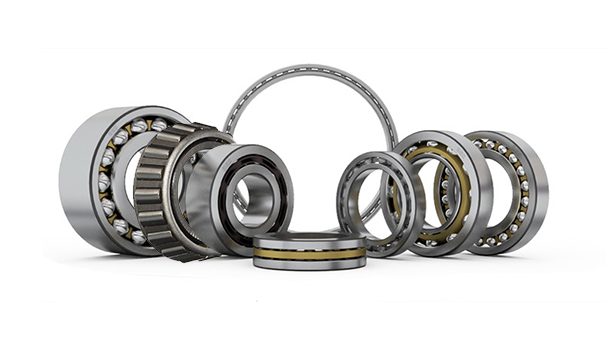Bearings are a very important part of any mechanical assembly ranging from a skateboard to the washing machine to a car. Bearings are used to maintain separation between moving parts and make the parts move without or with very less friction. One cannot imagine the world without bearings! Can you imagine your car or washing machine where moving parts are colliding with each other, sticking and wearing out? Being the most critical part, bearing failure is costly and should be avoided as far as possible.
Causes of bearing failures:
There are many causes that can be identified for bearing failures. Let us see them one by one.
Improper Lubrication
One of the larger contributing factors to bearing failure is improper lubrication. Improper lubrication includes the use of wrong lubricant, insufficient lubrication, degradation of lubricants due to high temperature, and so on. When this happens, one would notice discolored rolling elements and rolling tracks and overheat.
Particle Contamination
Contamination means the presence of foreign particles in lubricants or cleaning solutions. These small particles can be dust, dirt, abrasive grit, metal chips, etc. They can leave scratches and cause lapping of the raceways.
Misalignment
Inside the bearing, the raceway ball track must be parallel to the raceway edges. When there is an impacted mechanical part like a bent shaft, out of square clamping nuts, etc. they cause misalignment. Misalignment can result in overheating or separator failure.
Corrosion
Corrosion damages the smooth surfaces of the ball and roller bearings. This corrosion is caused by bad lubricant, acid, the presence of moisture, etc.
Overheating
Excessive temperature and improper lubrication can cause overheating. High temperatures can have deteriorating effects on lubricants like grease. It not only reduces its effectiveness but due to the loss of lubricating oils dried lubricant can also seize the movement of roller elements. Very high temperature can reduce the hardness of metal itself, resulting in bearing failure.
Improper storage and handling
Way of storage and handling is an important contributor towards bearing failure. Exposure to dust, dirt, any small metal particles in the working area, and moisture will lead to corrosion. Similarly, storing bearings at higher temperatures may reduce their shelf life.
Improper Mounting
Mounting of the bearings should be properly done mostly with a press fit on a rotating ring. If fitted tightly or loosely, it can lead to different types of wear. Any type of fitment like loose shaft fits, very tight nuts, loose housing fits, etc. would result in denting, wear, cracks and heating.
Beyond these, there are additional causes like excessive loading, electrical damage due to the passing of current, and so on. Looking at these reasons and taking preventive action is the key.
Preventing Bearing failures with NBBC
Causes of Bearing Failure
Failure of bearing can have a much higher impact than just unexpected downtime. There are many things like unexpected and increased machine downtime, increased maintenance, delivery issues, impact on revenue, and loss of reputation which can be linked to just a simple event like bearing failure.
Preventing bearing failures is the key focus be it any manufacturing plant or an engineering workshop. With the service offerings provided by New Ball Bearing Co. (NBBC), it will be easily possible for you to choose the best type of bearings. Beyond this, you will receive excellent aftersales service like their thousands of happy customers.

